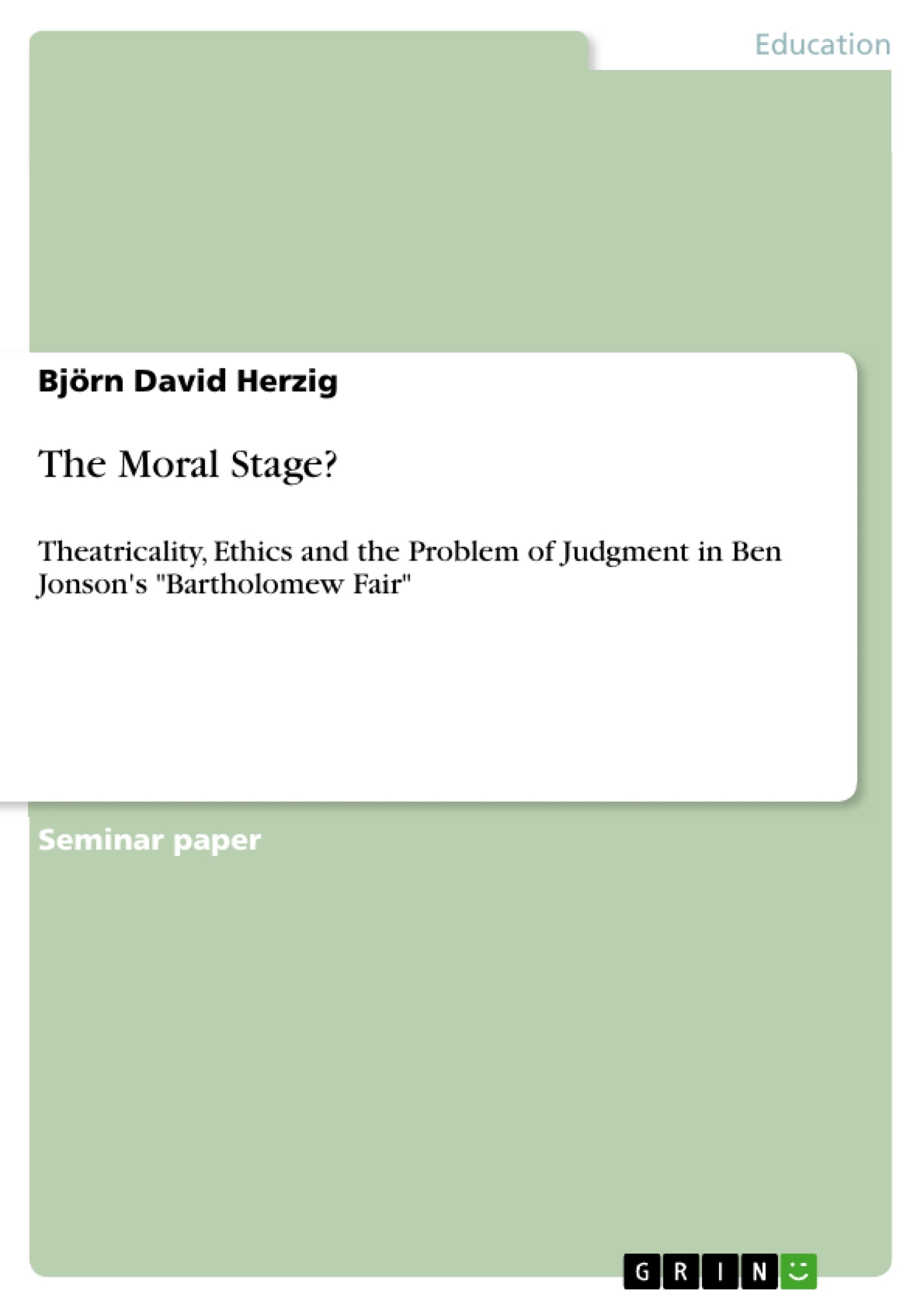In the course of this essay, I shall focus upon the English playwright Ben Jonson's (1572 - 1637) complex relation to questions of theatricality, aesthetic judgment and the ethical value of dramatic production as expressed in his later prose-comedy "Bartholomew Fair" (1614). By way of a close reading of the most relevant passages of the play, I will try to provide a detailed investigation into his moral criticism of contemporary society, his conception of theatricality as a vehicle for moral education, and the role of distanced intellectual judgment as a crucial factor in this process.
Inhaltsverzeichnis (Table of Contents)
- Introduction
- Aesthetic Preliminaries: The 'Induction on the Stage'
- The 'Soulless Fair': Jonson's Analysis of the Human Condition
- Stairway to Salvation? - Three Moral Case Studies
- Quarlous: Pragmatic Reason
- Overdo: Philanthropic Naïveté
- Busy: Religious Hypocrisy
Zielsetzung und Themenschwerpunkte (Objectives and Key Themes)
This essay examines Ben Jonson's play "Bartholomew Fair" (1614), focusing on his views on theatricality, aesthetic judgment, and the moral value of dramatic production. Through a detailed analysis of key passages, the essay investigates Jonson's moral critique of contemporary society, his concept of theater as a tool for moral education, and the role of distanced intellectual judgment in this process.
- Jonson's ideal audience response and the importance of intellectual engagement.
- The portrayal of the "Fair" as a metaphor for the moral condition of humanity.
- The analysis of three characters (Quarlous, Overdo, Busy) who represent different approaches to morality.
- The tension between moral criticism and dramatic reconciliation in the play's ending.
- The potential of theater to serve as a moral educator for the audience.
Zusammenfassung der Kapitel (Chapter Summaries)
The first chapter delves into Jonson's concept of an ideal audience response and his emphasis on intellectual engagement by analyzing the "Induction on the Stage." This section examines the aesthetic prerequisites Jonson sets forth for understanding his play.
The second chapter focuses on the play itself and explores Jonson's depiction of the "Fair" as a key motif for portraying the overall moral condition of humanity.
The third chapter delves into the interpretation of three characters (Quarlous, Overdo, Busy) who stand apart from the central theme of the "Fair," representing exceptional cases of (im)moral behavior. This chapter examines how their claims to moral superiority are challenged by their transformations throughout the play.
Schlüsselwörter (Keywords)
The key concepts explored in this essay include theatricality, aesthetic judgment, moral education, intellectual engagement, satire, social critique, dramatic representation, and the human condition.
Frequently Asked Questions
What is Ben Jonson's "Bartholomew Fair" about?
It is a prose-comedy that provides a satirical analysis of the human condition and a moral critique of contemporary London society through the setting of a public fair.
How does Jonson view the role of the theater?
Jonson conceives theatricality as a vehicle for moral education, provided the audience uses distanced intellectual judgment rather than emotional immersion.
Who are the main characters analyzed in the essay?
The essay focuses on Quarlous (pragmatic reason), Overdo (philanthropic naïveté), and Busy (religious hypocrisy).
What is the significance of the "Induction on the Stage"?
It sets the aesthetic preliminaries for the play, outlining Jonson's expectations for an ideal audience response based on intellectual engagement.
What is Jonson's critique of religious hypocrisy?
Through the character of Busy, Jonson satirizes the Puritans of his time, showing their moral claims to be self-serving and inconsistent.
Is "Bartholomew Fair" a moral play?
Yes, it explores the tension between moral criticism and the reality of human fallibility, ultimately seeking to educate its viewers.
- Quote paper
- M.A. Björn David Herzig (Author), 2004, The Moral Stage?, Munich, GRIN Verlag, https://www.hausarbeiten.de/document/141828


